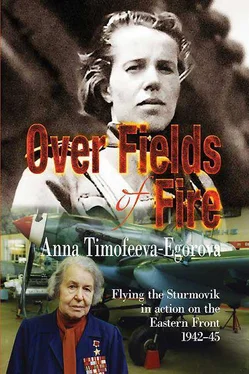Later I was told that the whole camp was overwhelmed by the news as if by an exploded bomb: “A Russian female pilot!” The Germans surrounding me were arguing loudly about something. I understood one word: “lockup”. Then they carried me on the stretcher through a narrow corridor made of barbed wire: I could see watch towers with submachine-gunners on them. From behind the barbed wire on both sides I heard a sort of buzzing, and something flew onto me. It appeared that the French, Italians, British POWs of the Küstrin 165 165 Translator’s note — now Kostrzyn.
camp were throwing me pieces of bread and sugar as a sign of support and solidarity. Yulia, walking beside the stretcher, collected everything and put it into the lap of her Army skirt.
Yulia Krashchenko and I were placed into an isolated stone cell. There were smooth concrete walls, two-tier bunks by one of the walls. There was a low cement ceiling with a wooden crossbar and a bulb on it, two small windows with double bars. The lockup was formerly located on these premises.
Yulia tipped off onto my legs (there was no other place) all the pieces of bread she had picked up, and at that moment a huge Gestapo man, who could speak reasonable Russian, came in, two German soldiers with him. “You will be fine here!” he addressed me and added straightaway: “What kind of rubbish is this?”
The German pointed his knout at the bread lying on my bunk: “Take it away!” The soldiers scooped everything up, not leaving a single bit. Yulia began to ask them to leave us the bread and sugar, but the Gestapo man was implacable. Then they left, but a submachine-gun-armed Hitlerite with a wooden look stood by the door of the lockup. Yulia had hidden under me (to be precise, under my bed, in a scorched flying boot) my Party membership card, two Orders of the Red Banner, a medal ‘For Valour’ and one ‘For the Defence of the Caucasus’.
Thus began my nightmarish existence, full of mental anguish and physical pain, in the ‘SZ’ Fascist camp.
The lockup, according to the Hitlerites’ point of view, was the most appropriate place for a person who was between life and death. Everything they were doing to me was in the spirit of Nazism. They didn’t torture me, didn’t torment me — no, they simply threw me into a damp concrete casemate, and threw me on the mercy of fate without elementary medical aid. They didn’t kill me straightaway but with Jesuit cruelty gave me the chance to die on my own, slowly and agonisingly. But I was saved from death by something they hadn’t thought about — human solidarity. The very same day I was put inside the lockup a real battle for the life of the Russian female pilot began — a battle joined in by dozens and hundreds of people representing the most varied nationalities. By that time a strong, deeply conspiratorial clandestine resistance organisation was operating in the camp. Its members were conducting a broad propaganda campaign among the inmates, delivering them the truth about the situation on the fronts, organising acts of sabotage, unmasking traitors, supporting the sick and wounded. From the first minute of my presence in the camp I, all unsuspecting, found myself observed by the organisation, one of whose leaders was Doctor Sinyakov, known as ‘The Russian Doctor’. He had been head of a hospital in Kiev, and when our troops were leaving the city, all who could walk left. Only soldiers badly wounded during the siege of Kiev — there were a large number of them — were left. He got to someone on the phone, carts arrived to pick the wounded men up and transport them to the rear. All the other doctors had scattered, and the nurses and medics also fled in fear. Kiev had already been occupied, the sound of shooting was already heard nearby, but together with one nurse and some slightly wounded men assisting them, he carried down and loaded the badly wounded into the carts. The Germans had already begun to fire at the convoy — they managed to set out, but the Germans caught up with them… They shot dead everyone, leaving only him and a wounded female nurse. Both were placed in a cellar, and the nurse died in his arms: that was how he told his story. Then he found himself in the camp…
Doctor Sinyakov’s first concern was naturally my medical condition. For the experienced doctor even a brief glance at me at the moment I was being carried through the camp on a stretcher was enough to be sure that I was in the most serious condition. If no immediate aid were provided, then…
The clandestine committee instructed Doctor Sinyakov and a Belgrade University Professor Pavlo Trpinac to try to get the camp administration’s permission to treat the wounded POW. Then Sinyakov reported to the camp office and appeared before the Commandant. Looking at the Doctor from outside, it was impossible to ascribe to him the power, energy and firmness he really possessed. Not a tall man, emaciated, slow in his movements, with a shock of half-grey unruly hair… He spoke German unhurriedly, but in his every word there was steel and self-confidence.
“A badly wounded female Russian pilot has arrived in the camp…”
“And what of it?” The Fascist said. “New parties of prisoners arrive here daily. The Reich needs labour…”
“She’s not like all of them, she’s maimed and burned all over… She’s had no medical treatment for ten days.”
“It’s not a hospital here…”
“On behalf of all the camp prisoners I demand that Doctor Trpinac and I be given access to the wounded woman.”
“You demand, do you?” The Gestapo man went purple. “For that one word I could simply…”
Yes, here in the camp everything was simple… Death called up new victims from the POW ranks on a daily basis. Insubordination — a bullet; refusal to work — a bullet. Any guardsman was a judge. Everything was as simple here as in the Stone Age. Sinyakov knew all that, and yet he looked directly into the Hitlerite’s mad eyes… The Doctor was protected from the Nazi’s fury by his hands: the cunning, strong, capable hands of a surgeon…
When Georgiy Fedorovich had arrived in the Küstrin camp in another party, he was walked to what they called the revier 166 166 Abbreviated from the German word ‘Krankenrevier’ (meaning ‘sick bay’ or ‘dispensary’) this was a barrack for sick concentration camp inmates. Most of the medical personnel were inmates themselves.
or just the infirmary, protected by guards in the middle of the camp behind the barbed wire. The Doctor was greatly surprised seeing in this hell, in this stationary Fascist execution truck, a surgical table, a scalpel, bandages, iodine and other stuff. But then it became clear: the infirmary was here not because of humanism. It was just that 1944 was coming to an end, our army had entered Europe, and the Fascists could no longer kill all the POWs… The front was gobbling up Hitler’s divisions. Germany badly needed labour, but the POWs living in hellish conditions were dying in their hundreds and thousands. This situation had become disadvantageous to the Reich, and that was why the hospital had been established. Actually, there was another reason. POWs were carriers of disease, and the Fascists were terrified of infection in their densely populated country. For this reason people would be sent over to the revier , behind the third row of barbed wire, on the smallest suspicion of disease.
When Doctor Sinyakov was appointed as a surgeon, he was ordered to operate on the stomach of a maimed, burned, dying tankman who was barely breathing. All the camp Germans, headed by Doctor Koschel, came to see the ‘Russian Doctor’s’ first operation. Koschel brought along his fellow German surgeons and along with them the French, British and Yugoslav specialists from among the prisoners. Let them, he said, see for themselves what sort of medics these worthless Russians are! The patient was brought in. The hands of Georgiy Fedorovich’s assistants were shaking from worry — behind their backs someone among the Fascists was loudly holding forth about how the best Russian doctor of medicine was no better than a German medical orderly. And Doctor Sinyakov, his legs barely holding him up, pale, barefoot and ragged, was performing a stomach resection. His movements were accurate, confident and those present understood that this surgeon didn’t need an exam. After a one-and-a-half-hour long operation, superbly performed by Georgiy Fedorovich, the Germans left. The French, British and Yugoslavs remained. Standing up, they cheered the Russian doctor’s first victory in captivity. “ Tovarich 167 167 Translator’s note — comrade.
…” said Pavle Trpinac, the only Russian word he knew, and shook Sinyakov’s hand.
Читать дальше












